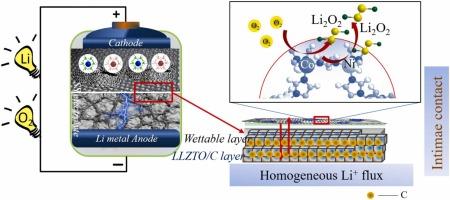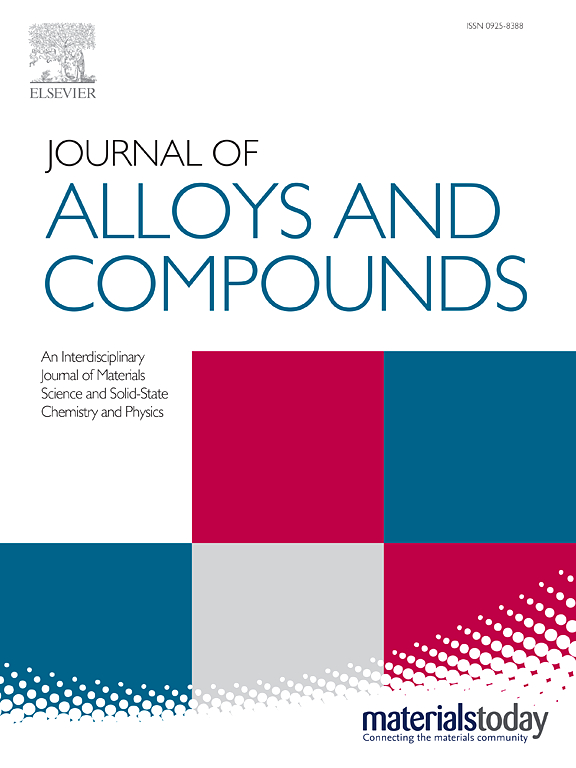Ensemble effect in porous bimetallic N/C nanocage-grafted CNTs for improved Li-O2 battery Cathodes
IF 5.8
2区 材料科学
Q2 CHEMISTRY, PHYSICAL
引用次数: 0
Abstract
The geometric design of atomically dispersed 'framework-active sites' grafted with carbonaceous materials to establish a well-connected three-dimensional network represents a compelling strategy for enhancing the performance of lithium-oxygen batteries, particularly in terms of cyclability. This paper introduces a simple approach that utilizes self-assembly heterogeneous nucleation to fabricate discrete bimetallic (Co, Ni) micron lattices grafted onto CNTs, exhibiting commendable surface properties. This intriguing hierarchical structure optimally harnesses the profound structural effects of CNTs weaving matrix, thereby imparting essential properties to the cathode, including high catalytic activity, intrinsically accessible active sites, and continuous porosity to accommodate discharge products. And such binary metal-nitride grafted configuration is significant in mitigating the embarrassing presence of nitrides (low conductivity) and carbon material (inferior activity). Consequently, cell measurement results indicate that a comparable capacity of 8599.7 mAh g⁻¹ and cyclic performance exceeding 200 cycles are achieved in a semi-solid state battery, outperforming commercially available RuC catalysts. And the DFT calculations further demonstrate the strong electronic coupling transfer and exceptional bifunctional activity observed in this binary metal-nitride sample. Therefore, this work exemplifies both steerable preparation techniques and the considerable potential inherent in geometric design for bimetallic sites grafted with carbonaceous material-based catalysts as they transition from Li-O2 to Li-air batteries.

多孔双金属 N/C 纳米接枝 CNT 中的集合效应用于改良锂-O2 电池阴极
通过几何设计将原子分散的 "框架活性位点 "接枝到碳质材料上以建立连接良好的三维网络,是提高锂-氧电池性能(尤其是循环性能)的一种引人注目的策略。本文介绍了一种简单的方法,利用自组装异质成核来制造接枝到碳纳米管上的离散双金属(钴、镍)微米晶格,表现出令人称道的表面特性。这种引人入胜的分层结构充分利用了 CNTs 编织基体的深远结构效应,从而赋予阴极重要的特性,包括高催化活性、内在可访问的活性位点以及可容纳放电产物的连续孔隙率。这种二元金属-氮化物接枝配置在缓解氮化物(低导电性)和碳材料(低活性)的尴尬存在方面具有重要意义。因此,电池测量结果表明,半固态电池的容量可达 8599.7 mAh g-¹,循环性能超过 200 次,优于市售的 RuC 催化剂。DFT 计算进一步证明了在这种二元金属氮化物样品中观察到的强电子耦合转移和优异的双功能活性。因此,这项工作既体现了可操纵的制备技术,也体现了从锂-氧化物电池过渡到锂-空气电池的过程中,接枝碳质材料基催化剂的双金属位点几何设计所固有的巨大潜力。
本文章由计算机程序翻译,如有差异,请以英文原文为准。
求助全文
约1分钟内获得全文
求助全文
来源期刊

Journal of Alloys and Compounds
工程技术-材料科学:综合
CiteScore
11.10
自引率
14.50%
发文量
5146
审稿时长
67 days
期刊介绍:
The Journal of Alloys and Compounds is intended to serve as an international medium for the publication of work on solid materials comprising compounds as well as alloys. Its great strength lies in the diversity of discipline which it encompasses, drawing together results from materials science, solid-state chemistry and physics.
 求助内容:
求助内容: 应助结果提醒方式:
应助结果提醒方式:


